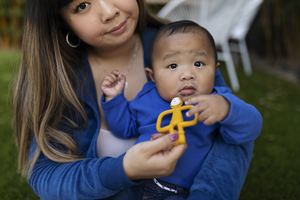Learn why leading HR professionals trust ekincare! Explore Now

Childbearing could be the most beautiful yet challenging time for a woman. The experience is marked by physical, emotional, and psychological changes that come with pregnancy and postpartum. Big changes can be overwhelming. While this period is often portrayed as a time of joy and miracle, it is important to recognise the intricacies of how it affects women's mental health.
In recent research conducted in India, it was found that perinatal depression affects between 14% and 24% of the population. Additionally, a 2020 study estimated the prevalence of pregnancy-related stress to be 30.9% and pregnancy-related anxiety to be 23%.
Beginning from conception to connecting with the newborn child, an individual goes through many challenges that affect their mental health in so many ways. It is important to understand the intricacies so that both the parent and the child can be physically and emotionally healthy.
Perinatal mental health (PMH) challenges emerge throughout pregnancy or in the initial year postpartum. Post-traumatic stress disorder (PTSD), anxiety, postpartum depression, and postpartum psychosis could potentially be included. Apart from these conditions, women also tend to face problems like feelings of guilt and shame, difficulty bonding with their babies, and a loss of motivation to perform daily tasks.

1) Emotional Rollercoaster
Apart from the well-known physical changes, pregnancy also comes with major emotional shifts. From hormonal fluctuations to the anticipation of parenthood, everything can contribute to a range of emotional waves, from excitement and joy to anxiety and fear.

2) Body Image and Self-Esteem
The physical changes that come with pregnancy, such as weight gain and swelling feet, can impact body image and self-esteem. Both social and personal expectations surrounding pregnancy can make one feel inadequate and unattractive. This can affect how they see themselves and feel about themselves.
3) Support Systems
With all of this going on, pregnancy is a time when a woman needs a very robust support system. Be it from a partner, family member, or friend, having people who are ready to listen, understand, and show up when they are going through these complexities can make the journey a little easier.

1) Baby Blues versus Postpartum Depression
A well-known and common emotional state that is experienced during the early post-partum period is "baby blues." This time is characterised by mood swings and fatigue. However, this emotional state can be more intense and prolonged for some people who have postpartum depression. This condition is more severe and can be persistent. So, seeking professional intervention early can be helpful.
2) Maternal Mental Health
Baby blues and postpartum depression aren't the whole picture of maternal mental health. Conditions like postpartum anxiety, obsessive-compulsive disorder (OCD), and post-traumatic stress disorder (PTSD) can also pop up. The mental health challenges faced by women after pregnancy are complex and diverse.
1) Open Communication
Create an environment where women can feel safe communicating about their emotions and needs. Let them know verbally, and through your actions, that you are there for them. This reassures them that they are not alone and can express their feelings, fears, and concerns without judgment. That would also give an early indication of any serious mental health condition.

2) Professional Support
There are mental health practitioners who have expertise in perinatal mental health. So, there are effective therapeutic interventions, counselling, and, if necessary, medication that can help manage and overcome these complicated challenges.
3) Self-Care Practices
Prioritising self-care during and after pregnancy is very important for mental health. This involves prioritising adequate rest, adhering to a balanced diet, and engaging in activities that promote joy and relaxation.
Be sure to catch the video for a comprehensive guide on achieving balance and vitality in your busy life as a mom. Don't miss out on these invaluable insights! Watch Now!
4) Community and Peer Support
This time can be really lonely and isolating. Connecting with other women who are going through the same phase provides a sense of belonging and can help in navigating the complexities better. 
Pregnancy can be a beautiful experience, provided the woman is given emotional support and adequate care during this period. Regular check-ups with medical professionals and personal check-ins to see how they are doing mentally and physically can make a huge difference in their journey. A happy pregnancy equals a happy mom, which equals a healthy baby.
ekincare provides access to mental health practitioners, enabling pregnant women to seek support and talk about how they feel in a convenient and timely manner. With ekincare, women can prioritise their mental wellness alongside their physical health, ensuring a holistic approach to pregnancy care.
Learn how your organisation can get the best employee health and well-being experience with ekincare`s commitment to quality.